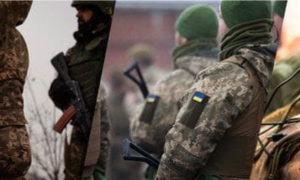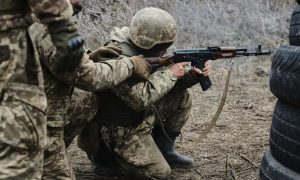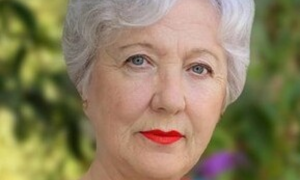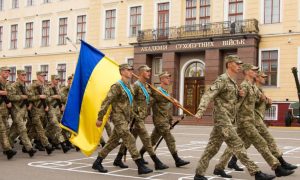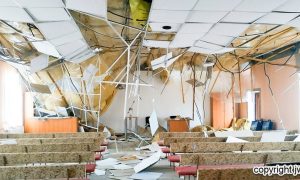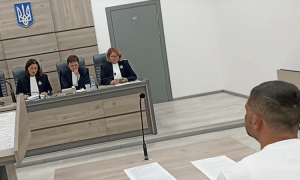The Supreme Court of the self-declared Donetsk People’s Republic banned Jehovah’s Witnesses on 26 September, a decision that cannot be challenged. Jehovah’s Witness activity “in any form” would face criminal punishment, the General Prosecutor’s Office announced. Convictions could lead to a maximum eight-year jail term.
On 26 September, the Supreme Court of the self-declared Donetsk People’s Republic, an unrecognised entity in eastern Ukraine, banned Jehovah’s Witnesses entirely. The ban – which cannot be challenged – followed several Supreme Court decisions declaring their literature and international website “extremist”.
The General Prosecutor’s Office announced on its website the same day that any future activity by Jehovah’s Witnesses “in any form” would face punishment under the Criminal Code. “Organising an extremist organisation” and “organising the activity of an extremist organisation” are both punishable by up to an eight-year jail term (see below).

Pressure on Jehovah’s Witnesses from police and State Security Ministry secret police stepped up from 2017, with raids on communities, seizures of literature and community documents, and threats not to meet for worship. Authorities have also “systematically seized” Kingdom Halls, with nine confiscated in 2017 alone. The authorities “use the pretext of fighting extremism to persecute Jehovah’s Witnesses for their peaceful worship”, Jehovah’s Witnesses complained to Forum 18 (see below).
As well as the accusation of “extremism” in its Supreme Court suit, the General Prosecutor’s Office accused Jehovah’s Witnesses of not having local registration. However, Culture Ministry and Justice Ministry officials told Forum 18 that no religious communities (apart from the two Moscow Patriarchate dioceses) currently have registration. An amendment to the Religion Law gives religious communities until 1 March 2019 to lodge registration applications (see below).
In 2016 the Supreme Court also declared three Muslim booklets “extremist” in a decision which could not be challenged. Four websites with the text of one of the booklets were banned the following year (see below).
The Supreme Court refused to put Forum 18 through to Judge Liliya Reznikova, who heads the Court’s civil division and who presided over all the banning decisions, to find out why she and her colleagues approved the bans (see below).
The General Prosecutor’s Office refused to put Forum 18 through to General Prosecutor Andrei Spivak, who lodged the suit to have Jehovah’s Witnesses banned (see below).
Asked what would happen if Jehovah’s Witnesses continue to meet for worship after the ban, given the warning that they face “criminal responsibility”, the duty officer at the State Security Ministry said he did not know. “Where are they meeting?” he asked Forum 18 (see below).
The moves to criminalise the exercise of the right of Jehovah’s Witnesses to exercise freedom of religion or belief mirror those in neighbouring Russia, which supports the rebel Donetsk authorities. Russian courts declared many Jehovah’s Witness publications “extremist” and they were banned. Then, in 2017, Russia’s Supreme Court banned the entire community as “extremist”. Now over 80 Jehovah’s Witnesses face criminal prosecution for alleged “extremist” activity (see F18News 13 September 2018Â http://www.forum18.org/archive.php?article_id=2412).
Pro-Russian rebels seized parts of Ukraine’s Donetsk Region in April 2014 and proclaimed what they called the Donetsk People’s Republic (DPR). Heavy fighting ensued. The rebel administration currently controls nearly half of Ukraine’s Donetsk Region.
The rebel Donetsk authorities are increasingly seizing or sealing places of worship to prevent communities from meeting. As well as Jehovah’s Witness Kingdom Halls, a mosque, a Seventh-day Adventist church and a Baptist church are among those seized or sealed (see F18News 12 October 2018Â http://www.forum18.org/archive.php?article_id=2422).
Pro-Russian rebels similarly seized parts of Ukraine’s Luhansk Region in March 2014 and the following month proclaimed what they called the Luhansk People’s Republic (LPR). Heavy fighting ensued. The rebel administration currently controls about a third of Ukraine’s Luhansk Region. The rebel-held area adjoins the rebel-held area of Donetsk Region.
No Baptist, Seventh-day Adventist or Pentecostal communities gained the compulsory re-registration the self-declared Luhansk People’s Republic demanded by 15 October. Adventists received registration denial “with great pain” and reluctantly halted all their activities, trying to avoid church property seizure (see F18News 23 October 2018Â http://www.forum18.org/archive.php?article_id=2425).
Jehovah’s Witness ban
On 26 September a panel of three judges under presiding Judge Liliya Reznikova at the rebels’ Supreme Court in Donetsk banned all Jehovah’s Witness activity “in connection with the carrying out of extremist activity”, according to the decision seen by Forum 18. The suit had been brought by the then acting General Prosecutor Andrei Spivak (now the General Prosecutor).
However, the first of the prosecutors’ complaints was that groups of Jehovah’s Witnesses were allegedly meeting without making themselves known to the authorities and being put on a register.
The prosecutors then complained that community members were distributing literature “inciting religious discord and propagandising the exclusivity, superiority and inadequacy of individuals based on their religious affiliation”.
Prosecutors then alleged that Jehovah’s Witnesses’ rejection of blood transfusions, “even in life-threatening situations”, testifies to “this religious community’s carrying out of extremist activity, creating a real threat of causing harm to the health of individuals, personality, public order, society and the state”.
The Court decision claims that, in their rejection of blood transfusions, Jehovah’s Witnesses cite Old Testament passages “which have no relation at all to the given restriction”. The Court decision gives no source for this interpretation of Biblical passages, or why it might be relevant to the case.
The Culture Ministry wrote to confirm that Jehovah’s Witnesses had not lodged registration applications between 2014 (when the rebels established control of the area) and late April 2018. The Culture Ministry appears not to have indicated that at that period the rebel Donetsk authorities had not granted registration to any religious communities.
The Court decision cites the earlier bans on Jehovah’s Witness publications, as well as the main international Jehovah’s Witness website (see below).
The rebels’ State Security Ministry (SSM), in a 16 July letter, noted that the Jehovah’s Witness headquarters near Lviv in Ukraine does not have its own printing press and therefore imports all its publications “with subsequent transport to the Donetsk People’s Republic”. The SSM claimed that local Jehovah’s Witnesses share these publications not only among their adherents but among people more widely “in an open, persistent way”.
The Court decision notes that the ban comes into force immediately and cannot be challenged. The Jehovah’s Witness organisation is No. 51 on the list of banned social, religious or other organisations on the rebel authorities’ official website. It notes that the ban on organisations also extends to their “structural sub-divisions”.
Forum 18 was unable to find out why General Prosecutor Spivak chose to bring the banning suit to court. The General Prosecutor’s Office in Donetsk refused to put Forum 18 through to him. “We don’t give out phone numbers,” the duty prosecutor told Forum 18 on 1 November. “Come to his office during the reception hours.”
Jehovah’s Witnesses told Forum 18 after the decision that it was not a surprise, given the earlier raids on their communities, bans on literature and their website, and hostility from local officials.
“Neither the general prosecutor, who initiated the claim against our legal entity, nor the Court consulted with any of the Jehovah’s Witnesses during the proceedings,” Jehovah’s Witnesses added. “The banning is the latest development in an escalating pattern of religious oppression against Jehovah’s Witnesses in the region.”
“Criminal responsibility” if Jehovah’s Witnesses exercise freedom of religion
On 26 September – the same day the Supreme Court banned Jehovah’s Witnesses – an announcement on the General Prosecutor’s Office website highlighted the ban. “In future, the carrying out of activity by adherents of the given religious association in any form will attract criminal responsibility,” it added.
The announcement did not say which Criminal Code Article Jehovah’s Witnesses exercising their right to freedom of religion or belief would be punished under.
The duty prosecutor at the General Prosecutor’s Office refused to explain to Forum 18 what punishments Jehovah’s Witnesses could expect and why.
Article 329 of the Criminal Code punishes “organising an extremist organisation” with fines, compulsory labour or imprisonment of up to eight years. “Participating in an extremist organisation” carries a maximum punishment of four years’ imprisonment. Recruiting others to join such an organisation carries a maximum punishment of six years’ imprisonment.
Criminal Code Article 330 punishes “organising the activity of an extremist organisation”, including religious organisations, which have been banned by a court. Organising such activity carries a maximum eight-year prison term, participation in such activity carries a maximum four-year prison term and recruiting others carries a maximum six-year prison term.
Jehovah’s Witness website, literature bans
On 22 August, the Supreme Court declared the Jehovah’s Witnesses’ main international website jw.org “extremist” and banned it, according to court information. The same decision banned two other of their religious publications, bringing to 13 the number banned as “extremist”.
The Supreme Court refused to give Forum 18 the 22 August written decision.
In four separate decisions from July 2017 to March 2018, the Supreme Court declared 11 Jehovah’s Witness publications “extremist”. The 15 March 2018 decision banned four past issues of the Witnesses’ religious magazine, “The Watchtower”.
The Justice Ministry’s online list of banned “extremist literature”, as of 2 November, includes 12 Jehovah’s Witness items: the jw.org website, five magazines, three books and three booklets. The list does not include the two other Jehovah’s Witness publications the Supreme Court banned on 22 August alongside the website.
Muslim booklets banned
On 20 July 2016, the Supreme Court under presiding Judge Reznikova banned three Muslim booklets published by the Donbas Muftiate, according to the decision seen by Forum 18. Like all the other Supreme Court banning decisions, it too could not be challenged.
The acting General Prosecutor brought the suit, insisting that the booklets – “Islam – the Religion of All the Prophets”, “Prophets” and “Jesus, Peace Be Upon Him, in Islam” – were “extremist”. The decision ordered that any undistributed copies of the booklets should be confiscated. It did not say whether or not they would be destroyed.
The Justice Ministry’s online list of banned “extremist literature”, as of 2 November 2018, includes the three Muslim booklets.
On 3 February 2017, Judge Reznikova and two other Judges at the Supreme Court banned four websites where “Jesus, Peace Be Upon Him, in Islam” had been posted, according to the decision seen by Forum 18.
When State Security Ministry officers raided and closed down Al-Amal Mosque in Donetsk’s Kalinin District in June 2018, they seized religious literature which they claimed was “extremist”. Among the books officers seized, the Ministry identified two: “Fortress of a Muslim”, a collection of Muslim prayers which, as it noted, is banned in Russia; and “The Last Journey”, a book published by the Ukrainian Muslim organisation Al-Raid and which has also been declared “extremist” in Russia. Neither has been declared “extremist” by Donetsk’s Supreme Court (see F18News 12 October 2018Â http://www.forum18.org/archive.php?article_id=2422).
Earlier raids, literature warnings
From March 2017, police and State Security Ministry officers repeatedly raided Jehovah’s Witness communities, seizing religious literature and community documents and threatening communities to stop meeting. “The inspections were justified as necessary for combating extremism,” Jehovah’s Witnesses told Forum 18.
In August 2017, prosecutors began issuing written warnings to Jehovah’s Witnesses, Jehovah’s Witnesses told Forum 18. They advised them not to distribute their literature, as distribution is prohibited and makes individuals administrative¬ly liable.
In August 2017, prosecutor’s offices in Novoazovsk and Debaltsevo issued warning letters to local Jehovah’s Witnesses, directing them not to distribute “Awake!” and “The Watchtower” magazines without first obtaining a permit. On 1 September 2017, the Prosecutor’s Office in the city of Makeyevka issued a similar warning to local Jehovah’s Witnesses.
“In this way the authorities obstruct distribution even of religious materials not declared extremist and threaten to hold congregation elders liable for any of the Witnesses’ literature that is distributed,” Jehovah’s Witnesses complained.
Discriminatory Religion Law
The rebels’ People’s Council adopted a Religion Law on 24 June 2016. Article 3 included a ban on “the creation of sects or the spreading of sectarianism”, concepts that the Law does not define.
The Law does not explicitly ban exercising freedom of religion or belief without official permission. However, in outlining procedures for gaining state permission it presumes that such permission is required.
Article 7 requires a “religious group” to notify the local administration of its existence and where it meets, give full details of the leader and every member (including full name and address) and to be placed on a register. The local administration can reject the group’s notification, preventing it from functioning. A “religious group” has no legal status.
Article 8 requires a “religious organisation” to have 50 (or 10 in Article 9) adult members for a local organisation or 10 local organisations for a “centralised” religious organisation.
Article 21 appears to allow only centralised religious organisations to maintain international links, organise pilgrimages abroad and invite foreign clergy and preachers.
Unlike all other religious communities, Article 31 grants “legalisation” as centralised religious organisations to the two Ukrainian Orthodox Church Moscow Patriarchate dioceses at least partly in rebel-held territory, those of Donetsk and Horlovka. The Law does not explain why Moscow Patriarchate communities are treated differently from other communities.
On 13 April 2018, the People’s Council adopted an amendment to the Religion Law requiring all non-Moscow Patriarchate organisations to re-register by 1 March 2019. The amendment specifically banned religious organisations from functioning if they failed to get re-registration by the deadline.
Baptists elsewhere in Ukraine expressed concern about their fellow church members in rebel-held areas. “At present, no Protestant religious organisation is known to have got registration,” they told Forum 18. “The list of required documents and the conditions for submitting them change constantly.”
Baptists added that the leaders of religious organisations seeking registration “must not have links with Ukraine and must be loyal to the local authorities”.
No non-Moscow Patriarchate communities have legal status
An official of the Justice Ministry Department for Work with Non-Commercial Organisations in Donetsk said that the Culture Ministry takes all decisions on whether or not to register a religious community. “They take the decision and send it to us,” he told Forum 18 on 2 November. “So far the Culture Ministry have not sent us any decisions.” He confirmed that only the two Moscow Patriarchate dioceses currently have legal status.
Sergei Gavrish, the head of the Religion and Nationalities Department at the Culture Ministry in Donetsk, told Forum 18 on 11 October that some religious communities have lodged registration applications and “some are being processed”. He refused to say who they were from or how many there were. He stressed that communities have until 1 March 2019 to submit their applications.
Asked whether his Ministry would reject applications from any religious communities, Gavrish responded: “There are no limitations. Kiev Patriarchate, Greek Catholics, Hare Krishna – we’re ready to receive their applications.” Gavrish repeatedly refused to say if religious communities are allowed to meet if they do not have official permission.
Representatives of a wide range of religious communities of different faiths based outside rebel-held areas of Donetsk Region declined to discuss with Forum 18 the situation for their communities. (END)
